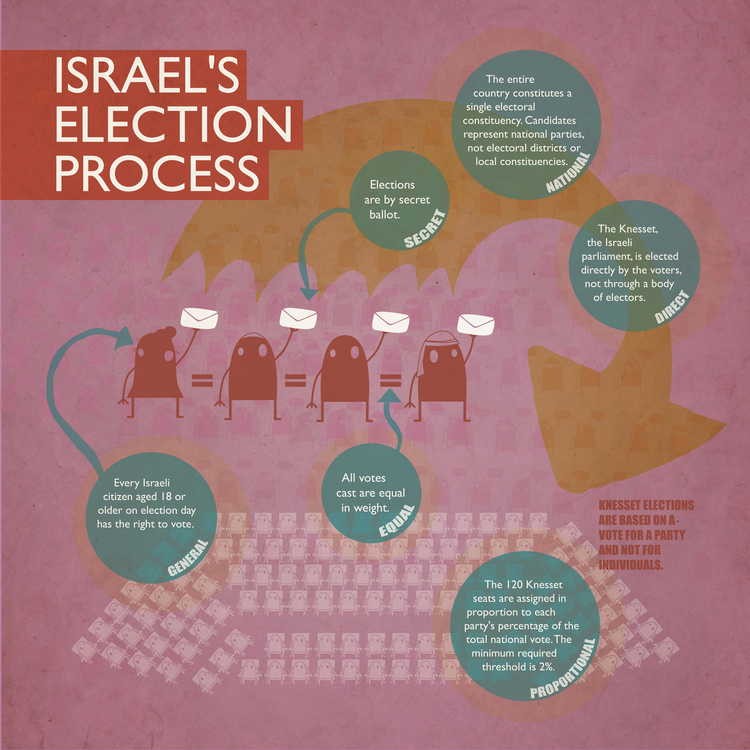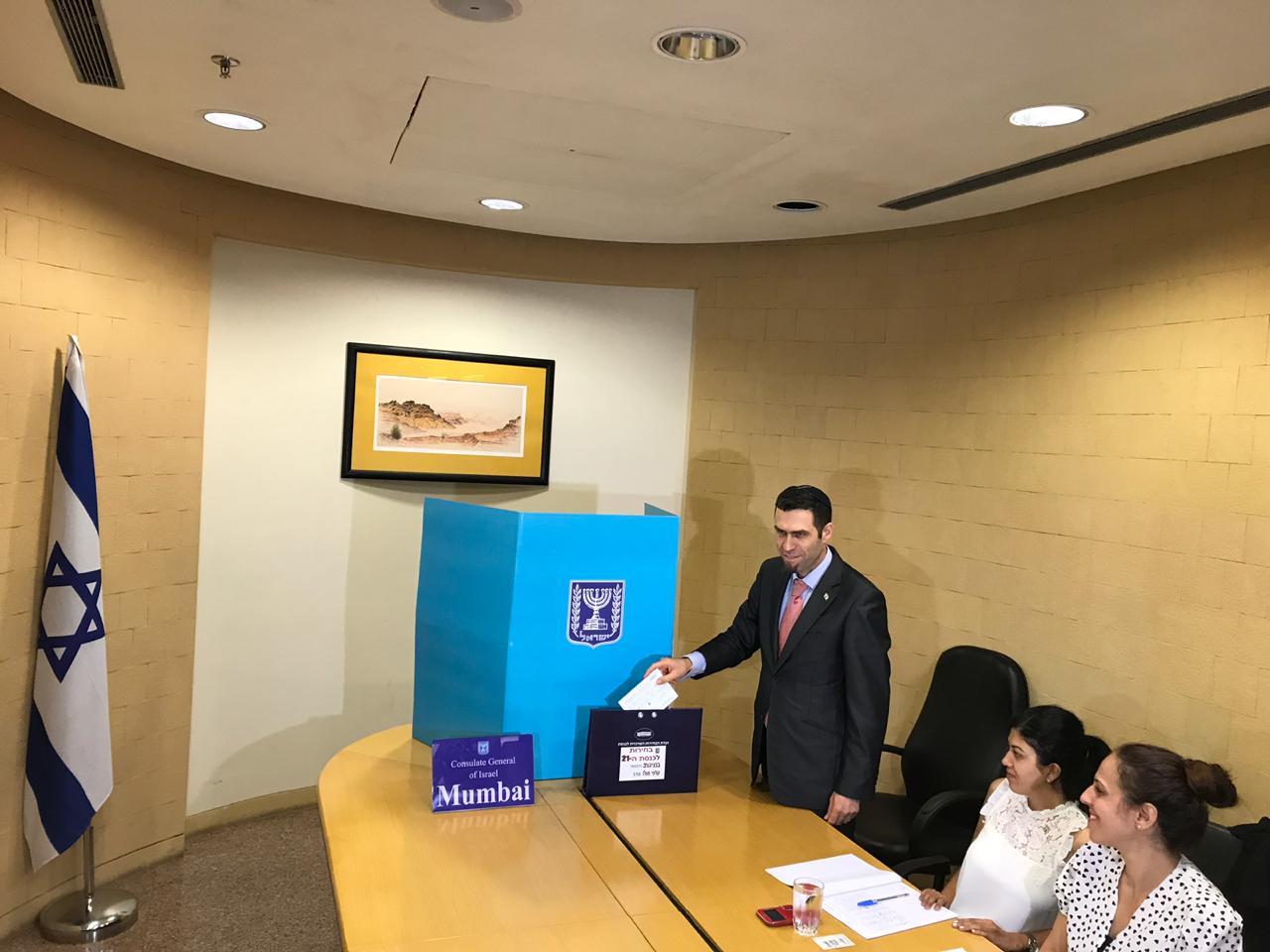Israeli citizens posted in India voted today for the Knesset, the Israeli parliament, ahead of the general elections set to take place in Israel on 9th April, 2019.
Israeli envoys and their family members posted in the Embassy of Israel in New Delhi and in the Israeli Consulates in Mumbai and Bangalore, took part in the early polls today. The 3 ballot boxes count for over 100 votes in India. The ballots from the three Israeli missions in India will be sent to Jerusalem, where they will be securely stored and opened to be counted during the general elections in the country on 9th April, 2019. The Embassy is among 96 missions worldwide voting today, accounting for 5000 voters.
Israel's Embassy in New Delhi is the largest Israeli mission in Asia. After casting his vote in New Delhi this morning, Ambassador of Israel to India, Dr. Ron Malka said, "We, the Israeli community in India, are proud to exercise our civic duty and right to vote in the Israeli elections. As the only democratic state in the Middle East, Israel’s democratic process offers equal voting rights to all its citizens, including its diplomatic community around the world. We are happy to take part in this celebration of democracy with our brothers and sisters in democratic spirit in India.”
Ya’akov Finkelstein, Israel’s Consul General in Mumbai: “Israel is a small country, but a big democracy, with a magnificent mosaic of opinions, sectors and parties. It is symbolic that elections in India and in Israel are held days apart from one another this April, as both successfully preserve similar democratic institutions and values since their establishment some 70 years ago, after British rule. Like our Indian friends, we are proud of our diverse society and vibrant democracy. Keeping in mind the situation in some of our neighboring countries, I believe both Indians and Israelis feel privileged to live in a free country and cherish their personal liberties."
Dana Kursh, Israel’s Consul General in Bangalore: “It is a privilege belonging to a democratic nation, and having the right, and the duty, to shape our future. I call all citizens of these two great nations to go out and vote.”
DEMOCRACY
Knesset elections 2019: Watch this short video for a quick overview:
Israeli citizens vote for their party of choice in national elections, bestowing sovereignty on the Knesset. The party leader who enjoys the confidence of a majority of Members of Knesset (usually from a coalition of parties) forms the government and becomes the prime minister. The single-chamber Knesset sits in Jerusalem. It has 120 members, who are elected to a four-year term. During its term, the Knesset may dissolve itself, leading to a new election.
Israel’s democratic foundations were laid by the Jewish community in the Land of Israel well before independence. The first elections to the community’s National Assembly were conducted in 1920, during British mandatory rule. From the very first Assembly, women enjoyed full rights to elect and be elected. The strong democratic institutions of the community laid the foundations for Israel’s parliamentary democracy once independence was achieved in 1948.
 EQUALITY AND CIVIL LIBERTIES
EQUALITY AND CIVIL LIBERTIES
A young society with ancient roots, Israel is to a widely diverse population of over 9 million citizens from many ethnic, religious, cultural and social background- a mosaic of people living together and contributing to its vibrant democracy.
Israel is home to a variety of thriving religious communities. These include different streams of Judaism, Christianity and Islam, as well as the Baha’i, Druze and Samaritan faiths.
In its first years, Israel absorbed, among others, more than 800,000 Jewish immigrants originating from Arab and Muslim countries throughout the Middle East and North Africa.
The term “Jew” originates from the biblical Israelite tribe of Judah, whose direct descendants are today’s Jews.
A majority of Israel’s 6.25 million Jews (75% of the total population) adopt a secular lifestyle. Those who choose religious observance, range from Orthodox, through traditional, to Conservative, Reform and Progressive Judaism.
2.1 million Israelis identify themselves as not Jewish, representing 25% of the population. Their choice of lifestyle vary widely.
Arab Sunni Muslims constitute the largest minority (some 1.5 million), including approximately 300,000 formerly nomadic Bedouins. Two additional Muslim groups are the Circassian community of the Galilee (about 4000 members) and the Ahmedi community in the city of Haifa (about 1000 members).
The Christian communities number about 162,000. While the majority of Israeli Christians are Greek Orthodox, Greek Catholic and Roman Catholic, dozens of Christian denominations find representation in Israel, as befits the cradle of Christianity.
Israel defines itself as a democratic and Jewish state. As a democracy, the law ensures equal treatment of all citizens, regardless of religion, race, sexual orientation or gender. Fundamental freedoms are guaranteed for all. At the same time, Israel was established as the national homeland of the Jewish people. Accordingly, Jewish traditions, culture and festivals feature prominently in public life.
On an individual level, the rights of every Israeli are fully protected, in law and in practice, whether they are male or female, Jewish or Arab, heterosexual or LGBT, physically and mentally fit or challenged. For example, Israeli women have held leadership roles well before the establishment of the state. Tel Aviv is one of the most LGBT-friendly cities in the world.
On a communal level, Israel officially recognizes 15 distinct religious groups, safeguarding their traditions and festivals. Arabic is an official language of Israel alongside Hebrew.
Israelis are guaranteed the basic means to fulfill their potential: all children between the ages of 3 and 18 enjoy free education; similarly, healthcare coverage is provided to all residents.
Dana Kursh, Israel’s Consul General in Bangalore, casting her vote

Ya’akov Finkelstein, Israel’s Consul General in Mumbai, casting his vote Deputy Chief of Mission, Maya Kadosh, casting her vote
Spokesperson, Avigail Spira, casting her vote